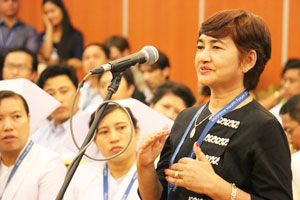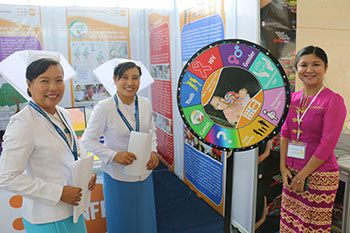On July 28 and 29 around 700 national and international participants gathered in Myanmar's capital Nay Pyi Taw to take stock, reflect and plan further action to achieve Myanmar's "Health Vision 2030". The ambitious goals of this vision is to reach universal health coverage in the next 15 years. The Health Forum Myanmar, led by the Ministry of Health, was the first of its kind in Myanmar and brought together all State and Region health ministers, as well as municipal authorities, other ministries, civil society, health workers' associations, academics and development partners.
UNFPA participated in this historical event in multiple ways. A parallel session was moderated by Janet Jackson, Representative of the UNFPA Country Office, on bringing health services to the people and addressing the unfinished health agenda. The brief presentations of the panelists, eminent speakers from the government, health professionals, academia and CSO sectors stimulated the thoughts of the participants. Dr. Kyaw Zin Thant, Director General of the Department of Medical Research of the Ministry of Health, provided a bold kick-off calling for changes in mindsets and harmonisation and more concerted support for citizen engagement. Professor Mya Thida, President of the Obstetrics and Gynaecology Society, called for more task shifting and skills building for midwives and the need for reporting on health data and reviews into maternal and infant mortality which remain high. Professor Richard Coker, of the London School of Hygiene and Tropical Medicine, stated that better data collection and increased sharing of data are of vital importance to better address challenges around multi drug-resistant communicable diseases such as TB. In the unfinished agenda, it are ethical and political decisions which in the end determine who access health care and who does not, he stated. Dr. Sid Naing, Country Director of Marie Stopes International, Myanmar, warned that the current developments in the provider market can result in communities being at the mercy of the market and that measures need to be taken to ensure that healthcare is at the mercy of the people. Finally, Professor Ne Win, President of the Myanmar Academy of Medical Science, bringing it all together emphasised the importance of Myanmar-specific researchers and specialists in communicable diseases and the urgency for upgrading skills - skills for knowledge generation and not simply skills for knowledge transfer.

A lively question and answer session followed the presentations in which important factors of the unfinished agenda were highlighted, such as the risk of leaving certain groups behind, including people in remote areas, poor people living in city slums, youth in general, and sex workers in particular. The role of midwifes and the importance to build their strengths in terms of numbers and capacities as well as increasing their competences was emphasized.
UNFPA took the opportunity of the Health Forum to interact with many of the participants and to raise awareness through its booth in the communal space of the conference. A ‘Wheel of Knowledge' allowed visitors to the booth to test their expertise and increase their knowledge on issues around sexual and reproductive health as well as the census. The ‘Wheel of Knowledge' attracted a lot of attention, which may also have been stimulated by the prizes to be won.

The Myanmar Health Forum was the first of its kind in the country and was successfully brought to an end while informing and inspiring many and contributing to the networks of those who are working to improve healthcare in Myanmar. However, as Janet Jackson remarked at the end of the panel session: "This maybe the first Health Forum, but it will take much more time and effort and likely many more Health Forums to achieve the goals of the unfinished health agenda."



